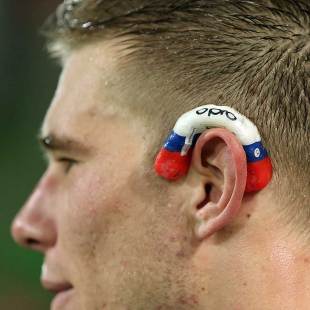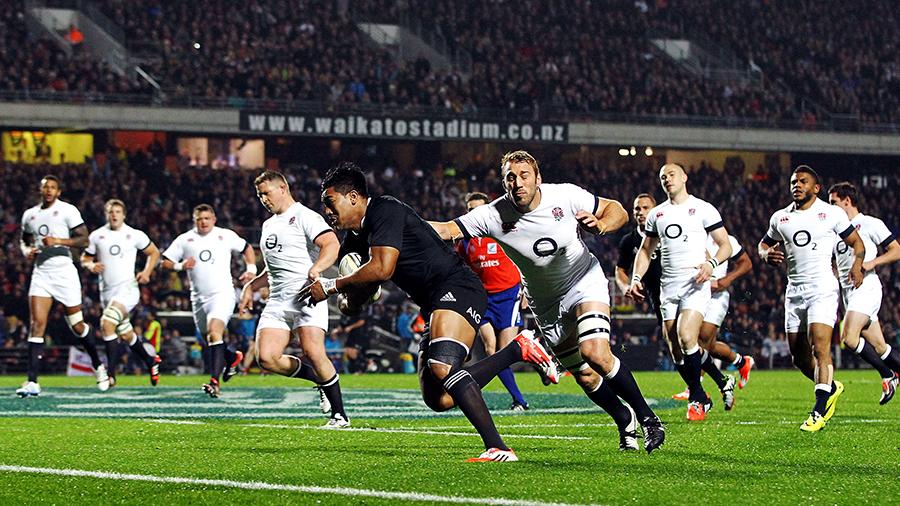|
Craig Dowd
Mouthguards key weapon against concussion
Craig Dowd
November 5, 2014

Jason Woodward ... this isn't best practice in the use of a mouthguard
© Getty Images
Enlarge
Rugby authorities must urgently require players to wear only certified mouthguards, in in a bid to reduce concussions. A properly fitted mouthguard will reduce the effects of a head blow, but the market has been flooded by people seeking to make serious money out of really poor products. If you have a look at kids at the weekend, they are chewing on their mouthguards or they've got them in their socks and they don't fit in their mouths anyway. You've got to be able to open your mouth and have the mouthguard stick to your teeth, and you have to ask how many parents are educated properly to know how to fit a guard or have had the importance explained to them. New Zealand Rugby and authorities worldwide can lead the way by part-funding superior mouthguards for every kid who plays; at the bare minimum, they should be certifying official mouthguards. Mouthguards are the only form of protection you are ever going to get. They are shock absorbers that can cushion impact and reduce injury. If you get hit in the head with a sledgehammer, you are going to come off second best regardless; there is not much you can do to protect the head. Some guys will strengthen their neck to minimise reverberations after a blow, but a properly fitted mouthguard remains the only other form of defence. And the key words are "properly fitted". I see kids out playing the game wearing absolute crap mouthguards. Boil-and-bite $5 mouthguards and the like do no good whatsoever, especially when much better alternatives are available for just another $5.
Rugby still a game for all sizes?I can totally sympathise with the campaign that has started against flimsy laws and poor enforcement around size mismatches that can contribute to harm on the field. The fact is there is no exact science, but mismatches are not sport. We don't want to see mismatches, but at the same time we do want to see everyone involved. It's a difficult one. It's been around for 50 years and it will be around for the next 50 unless we enter into a nanny state, which contact sports don't want to do; we want to teach these kids the game of rugby, and they need the contact in order to learn. The young, heavy kid who has grown too big too quickly might be playing against the other smaller kids, and it can look wrong when he is playing kids his own age who are much smaller. But it is also wrong to move that bigger kid to play with others who are of similar weight but are older than him and more mature; he becomes the little kid in that situation. He might not have grown into his own body, he might not have the awareness. Quite often, you see the big chubby kid running around, or even walking around, the field, not knowing what to do and not really wanting to be there because he'll get absolutely snotted. There's no winner. You try to look after the small kid by removing the big kid, but the removal puts him in a dangerous environment and it becomes a knock-on effect. It almost comes down to handling kids on a case-by-case basis because size doesn't necessarily equal ability. Because a kid is big it doesn't mean he can catch or pass, that's he's coordinated, or that he's even a threat to anyone on the field. If he's non-threatening, he should be kept in his age group and it levels itself out. 
Julian Savea has proven unstoppable against England © Getty Images
Enlarge
The Old DartNow the All Blacks have the United States behind them, and it is on to England and some things never change. England are desperate to make a go of their chance in hosting the 2015 Rugby World Cup, and they need to perform well in this end-of-year series. One of the common factors whenever we travel to England is the talk in the media, where they talk themselves up. I see the All Blacks hadn't even landed in England and there were further reports they were losing their aura. To my way of thinking, the All Blacks go into this Test with absolutely nothing to lose. Much like Graham Henry said a few months ago, a loss could even be good for the All Blacks. As I have said before, I started my career in 1993 and we lost to England and I swear, I never, ever forgot that loss; it scarred me for the rest of my All Blacks career. I never lost to England again; I refused to lose to them just because of the aftermath of that 1993 game. I don't want the All Blacks to lose - I never want the All Blacks - but I don't see how a loss could hurt the big picture; the vengeance in mind they would take with them into the 2015 World Cup would be even worse for England. Remember 2012: many of the current All Blacks do not remember fondly losing at Twickenham two years ago, and they will not want to repeat that. It's just a case of those older players passing it on to the younger players in the squad who haven't tasted defeat in those circumstances. 
Richie McCaw and Kieran Read don't "do" defeat well © Getty Images
Enlarge
The North-South DivideThere's always talk of the North-South divide in playing levels, but I feel one game can turn that argument around. In terms of the World Cup, no-one wants to show their hand this far out. I don't think the divide has ever really changed. The All Blacks have always had a 'winning mentality' but I think they have stepped it up one more level under Steve Hansen. This particular group just doesn't like losing; I'm not saying it hasn't always been the case, but it shines right through with these players. I think experience helps to galvanise that attitude. Richie McCaw, Dan Carter, Kieran Read, Conrad Smith are the leaders, and they don't like losing; they are seriously competitive, and they set very high standards. That is the mantra of the All Blacks among those leaders. And when you get young kids like Nathan Harris, Dane Coles or TJ Perenara coming into the group, they have to learn to be an All Black and what that means; being around those older All Blacks has a rub-on effect that ensures the knowledge is passed on. Where England do struggle at times is in the consistency of their selections. They have far greater playing numbers but New Zealand appear to manage much greater consistency in selection. I think a part of that comes from the number of overseas players involved in English clubs; you have to ask how many English players are playing in key positions. The Aviva Premiership is a strong competition, but it is chock-full with international players whereas, by comparison, we keep our Super Rugby for New Zealanders with only the very occasional foreigner. © ESPN Sports Media Ltd
|
Live Sports
Communication error please reload the page.
-
Football
-
Cricket
-
Rugby
-
- Days
- Hrs
- Mins
- Secs
F1 - Abu Dhabi GP
Abu Dhabi Grand Prix December 11-131. Max Verstappen ()
2. Valtteri Bottas (Mercedes)
3. Lewis Hamilton (Mercedes)
4. Alexander Albon ()
5. Lando Norris ()
6. Carlos Sainz Jr ()
-
ESPNOtherLive >>
Darts - Premier League
Golf - Houston Open
Snooker - China Open
Tennis - Miami Open

